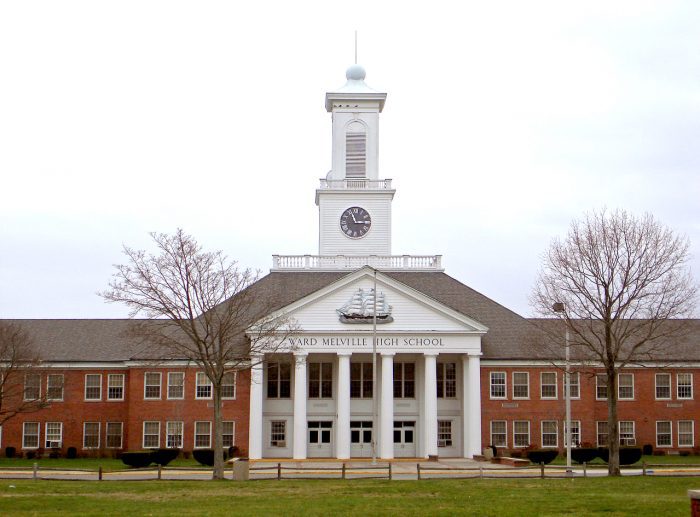Debate over arming school security guards continues
By Mallie Jane Kim
School building maintenance and improvement projects warrant considering a bond in Three Village Central School District, according to district officials.
A bond, which would need voter approval, would allow the district to borrow money over a 15-year term to address needs such as repairing the cupolas that top the aging brick buildings, updating science labs and adding air conditioning to elementary school cafeterias.
The annual increase in cost to the average taxpayer would be about $284, according to an estimate by interim Deputy Superintendent Jeffrey Carlson.
New York State building aid currently reimburses 66% of the cost and interest involved in building projects in Three Village, money that would be paid out over that same 15-year term as the loan.
“If we’re in agreement that work needs to be done, a bond is the fairest way for taxpayers to pay for it,” Carlson said at a Dec. 11 school board meeting. “No matter how you look at it, it’s a great deal that somebody else is paying two thirds of the cost of any of the projects that we have to do.”
The 66% reimbursement rate is high for a wealthier district like Three Village, due to a quirk in the building aid formula that states a district will get either the result of a wealth-calculation formula or the percentage it got the previous year, whichever is higher.
After Gov. Kathy Hochul’s attempts last year to cut state aid to many school districts, including about $8 million from Three Village, school officials wonder if the building aid formula may also face future adjustments. If so, Three Village building aid from the state could drop to 37.6% based on current wealth levels, according to Carlson, who added that voting to secure a bond would lock in the current aid rate. Any actual work would likely begin summer of 2026.
“Issuing a bond now should secure, in principle, this favorable reimbursement throughout the term of the bond,” said Tracy Harris, reading from a statement by a bond committee made up of parents, community members and stakeholders from district employee groups.
The committee visited each building for a firsthand review of projects that would fall under the bond and, after almost a year of discussions, unanimously recommended the board approve a referendum at the “earliest reasonable date.”
The committee also recommended a tiered approach with multiple propositions, separating out greater needs in one proposition and lower-priority needs in another, contingent on voters adopting the first proposition.
“This tiered approach empowers the community to support the level of investment they deem appropriate while maximizing the likelihood that critical projects are funded,” read Harris.
But Carlson cautioned the tiers could imply projects in a secondary proposition are not important. He said air conditioning in elementary school cafeterias and junior high school gyms may sound superfluous, except for a new state law requiring schools vacate rooms that reach 88 degrees Fahrenheit. Hot June or September days could render those spaces unusable.
“Air conditioning is not quite the luxury that it used to be,” Carlson said.
If the school board decides to approve a referendum at its January 8 meeting, residents could potentially vote on the bond in March, before the district begins its 2025-2026 budget planning.
Parents speak out against arming security guards
Debate among district parents about whether to arm school security guards continues to percolate after a student accidentally brought a parent’s loaded law enforcement weapon into a classroom at Ward Melville High School on Oct. 10.
District officials have said they are reviewing and updating security protocol, including working to acquire an AI weapons detection system. A newly formed parent group has called publicly over the past months for metal detectors and armed security guards, but now others are speaking against such measures.
“Actively bringing firearms to the school campus, regardless of whose hands they are in, is not the answer,” argued parent Ian Farber during the board meeting’s public comment section. “It’s incumbent on all of us to bolster effective security measures, not succumb to fears. For if we live in fear, we lose.”
One major concern was whether students with anxiety, ADHD or autism may, in a moment of crisis, inadvertently appear to be a threat to an armed security guard unfamiliar with how to appropriately deescalate such situations.
Others said armed guards and metal detectors offer a “false sense of security” and pointed to a 2021 academic study published on the JAMA network that found school shootings where armed guards were present had a 2.83% greater rate of deaths.
“There are more effective things that we can do before we go to the knee-jerk reaction of putting in metal detectors and armed guards,” said district parent Nadia Busseuil, who suggested preventative measures like addressing bullying and making sure kids are connected to caring adults like teachers, guidance counselors and psychologists.
To those who prefer arming guards, the option is not knee-jerk but a long time coming.
Three Village parent Alex Dicpinigaitis said district solutions like AI weapons detection are a waste of time.
“At the end of that project, we’ll still have the same situation but with a bigger tax bill: We’ll still have a bad guy with a gun and no good guy with a gun to stop him,” said Dicpinigaitis, whose Facebook group 3v Parents for Armed Security has over 200 members. “For a significantly lower price, we can arm our guards today.”
Groups on both sides of this issue are circulating petitions to present to the Board of Education.





